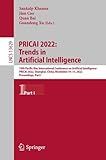PRICAI 2022: Trends in Artificial Intelligence [electronic resource] : 19th Pacific Rim International Conference on Artificial Intelligence, PRICAI 2022, Shanghai, China, November 10–13, 2022, Proceedings, Part I /
Material type: TextSeries: Lecture Notes in Computer Science ; 13629Publisher: Cham : Springer Nature Switzerland : Imprint: Springer, 2022Edition: 1st ed. 2022Description: XXIX, 592 p. 152 illus., 121 illus. in color. online resourceContent type:
TextSeries: Lecture Notes in Computer Science ; 13629Publisher: Cham : Springer Nature Switzerland : Imprint: Springer, 2022Edition: 1st ed. 2022Description: XXIX, 592 p. 152 illus., 121 illus. in color. online resourceContent type: - text
- computer
- online resource
- 9783031208621
- Artificial intelligence
- Computer engineering
- Computer networks
- Application software
- Image processing -- Digital techniques
- Computer vision
- Artificial Intelligence
- Computer Engineering and Networks
- Computer and Information Systems Applications
- Computer Imaging, Vision, Pattern Recognition and Graphics
- 006.3 23
- Q334-342
- TA347.A78
AI Foundations/Decision Theory -- Fair Allocation with Special Externalities -- Robust Weighted Partial Maximum Satisfiability Problem : Challenge to Sigma2P-Complete Problem -- Epistemic Logic via Distance and Similarity -- Abstract Argumentation Goes Quantum: An Encoding to QUBO Problems -- Diversification of Parallel Search of Portfolio SAT solver by Search Similarity Index -- Dagster: Parallel Structured Search with Case Studies -- Faster Optimistic Online Mirror Descent for Extensive-form Games -- Generalized 3-Valued Belief States in Conformant Planning -- Clustering-Based Network Inference with Submodular Maximization -- Applications of AI -- A LiDAR based Control Solution to Achieve High Precision in Autonomous Parking -- Multi-View Heterogeneous Temporal Graph Neural Network for ”Click Farming” Detection -- Deep forest with sparse topological feature extraction and hash mapping for brain network classification -- COVID-19 Forecasting Based on Local Mean Decomposition and Temporal Convolutional Network -- VMEKNet: Visual Memory and External Knowledge Based Network for Medical Report Generation -- Detecting Video Anomalous Events with an Enhanced Abnormality Score -- Frequency Domain Based Learning with Transformer for Underwater Image Restoration -- MMISeg: A Semi-Supervised Segmentation Method Based on Mixup and Mutual Information for Cardiac MRI Segmentation -- Dual-Stream Feature Fusion Network for Detection and ReID in Multi-Object Tracking -- A Novel Approach for Pill-Prescription Matching with GNN Assistance and Contrastive Learning -- A Robust Lightweight Deepfake Detection Network using Transformers -- A General Personality Analysis Model Based on Social Posts and Links -- Deception Detection Towards Multi-turn Question Answering with Context Selector Network -- A Unet with Sequence Information for Gastrointestinal Tract Segmentation -- Co-contrastive self-supervised learning for drug-disease association prediction -- Obj-SA-GAN: Object-Driven Text-to-Image Synthesis with Self-Attention based Full Semantic Information Mining -- Data Mining and Knowledge Discovery -- APGKT: Exploiting Associative Path on Skills Graph for Knowledge Tracing -- Features Fusion Framework for Multimodal Irregular Time-series Events -- A Multi-output Integration Residual Network for Predicting Time Series Data with Diverse Scales -- Time-series Prediction Improvement by Adaptive Decomposition -- Attention-based Memory-Enhanced Knowledge Tracing -- Dual-VIE: Dual-Level Graph Attention Network for Visual Information Extraction -- Temporal Edge-Aware Hypergraph Convolutional Network for Dynamic Graph Embedding -- Performance Improvement Validation of Decision Tree Algorithms with Non-normalized Information Distance in Experiments -- The Time-sequence Prediction via Temporal and ContextualContrastive Representation Learning -- Managing dataset shift by adversarial validation for credit scoring -- Linking Check-in Data to Users on Location-aware Social Networks -- Robust Subspace Clustering Based on Latent Low-rank Representation with Weighted Schatten-p Norm Minimization -- Evolutionary Computation/Optimisation -- Speeding up Genetic Programming Based Symbolic Regression Using GPUs -- High-Dimensional Discrete Bayesian Optimization with Intrinsic Dimension -- Multi-Objective Evolutionary Instance Selection for Multi-Label Classification -- An Investigation of Adaptive Operator Selection in Solving Complex Vehicle Routing Problem -- Evolutionary Automated Feature Engineering.
This three-volume set, LNAI 13629, LNAI 13630, and LNAI 13631 constitutes the thoroughly refereed proceedings of the 19th Pacific Rim Conference on Artificial Intelligence, PRICAI 2022, held in Shangai, China, in November 10–13, 2022. The 91 full papers and 39 short papers presented in these volumes were carefully reviewed and selected from 432 submissions. PRICAI covers a wide range of topics in the areas of social and economic importance for countries in the Pacific Rim: artificial intelligence, machine learning, natural language processing, knowledge representation and reasoning, planning and scheduling, computer vision, distributed artificial intelligence, search methodologies, etc.


There are no comments on this title.